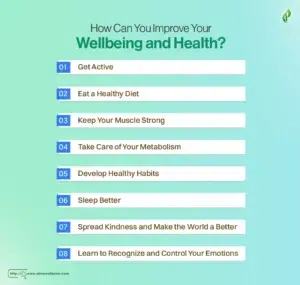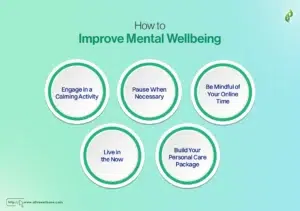
Last Updated on November 14, 2024 by Helena Akter
Stressed out, unable to fit in a workout, or struggling with eating habits? You’re not alone. We all face these challenges! That’s why you should know how to improve health and wellbeing for a happier and more satisfying life.
To improve health and wellbeing, get physical activity, balanced nutrition, muscle strength, stress management, and sufficient sleep. Plus, you can practice calm activities, live in the moment, and spend less time on the internet to improve mental health.
From here, you’ll find helpful tips on how you can improve your health, mind, and overall wellbeing. These simple yet impactful strategies can help improve your overall wellbeing and lead you toward a healthier lifestyle.
How Can You Improve Your Wellbeing and Health?
There are several activities to improve wellbeing, however, we’ve chosen the most effective ones based on reviews from real people.

1. Get Active
Being inactive can lead to health issues. So, you should try to move more and sit less for better health. It’s suggested that you should aim for around 150 minutes (that’s just two and a half hours) of moderate exercise every week. Remember, even a bit of activity can be beneficial.
Every minute of movement matters. Here are some tips to help you move more —
- First, Break down your workout routine into smaller, easier-to-achieve goals.
- Then, park your car a bit farther from your destination. It’s a small change, but it adds up.
- Next, choose stairs over elevators. It’s a great way to sneak in some exercise.
- At home, consider setting up a treadmill near your TV or a standing desk for your computer. It’s a win-win: you can stay entertained or productive while moving!
- Remember to take short breaks every hour. Set a reminder if it helps.
- You could also explore online workout classes. They’re a fantastic way to lose weight at home.
- Lunch breaks are perfect for walks. Or, maybe you could go on a ‘walking meeting’?
- Finally, keep some light weights nearby for quick arm workouts.
2. Eat a Healthy Diet
Choosing nutritious food for you and your family can be simpler than you think. A good diet isn’t just about avoiding unhealthy food, but also including a variety of good-for-you options.
Here’s how you can improve your eating habits —
- Try to include a variety of fruits, veggies, whole grains, nuts, beans, seeds, seafood, lean meats, eggs, yogurt, milk, and cheese in your meals.
- Slowly add more fiber to your diet to let your body adjust.
- Pick foods with little or no added sugar by reading the Nutrition Facts label.
- Stay away from foods that are low in vitamins and minerals.
- Swap saturated fats with unsaturated fats by using oils like canola, olive, or other vegetable oils instead of meat fats, butter, or shortening.
- Choose fresh poultry, lean meats, and fish over smoked, canned, or processed options. Go for frozen or fresh veggies without added salt, and pick foods with less than 5% of the Daily Value of sodium per serving. Wash canned foods to lower sodium.
3. Keep Your Muscle Strong
Building and keeping your muscles strong helps you stay active and enjoy your favorite activities at any age. Lifting weights also helps keep your bones healthy.
If you’re an adult, experts recommend you do strength exercises twice weekly, and if you’re a kid or teenager, three times per week.

Here are some tips to build muscle safely —
- Start slow, especially if you’re new to working out or haven’t been active lately.
- Start with light weights, making sure your form is correct. Slowly increase the weight as you get stronger.
- Pay attention to your body. If you feel joint pain, extreme tiredness, or muscle pain, you might be pushing yourself too hard.
- When lifting weights, use smooth, controlled movements. Avoid jerky or sudden movements.
- Breathe naturally when you’re exercising; don’t hold your breath.
- Don’t lock your joints in a straight position when you’re doing exercises.
- Think about joining a group class at a local gym, community center, or senior center, or find a personal trainer for extra help.
4. Take Care of Your Metabolism
As you get older, your metabolism tends to slow down. It means you burn fewer calories, digest food differently, and lose muscle mass. If you don’t adjust your diet and exercise habits, you might gain extra weight, which can affect your health.
Here are some tips to deal with changes in metabolism as you age —
- Follow a healthy diet.
- Make sure to drink enough water throughout the day.
- Try to snack less.
- Make sure you’re getting enough sleep.
- Be more active every day by using stairs and taking walking breaks.
- Stay away from tobacco. If you quit smoking, it can improve your health and help you live longer.
- Try to limit how much alcohol you drink. It’s high in calories and can make health problems worse, especially in older adults.
5. Develop Healthy Habits
Good habits can improve your health and add years to your life. You know it’s tough if you’ve tried to eat healthier, be more active, sleep better, quit smoking, or lower stress. But, studies suggest strategies to help you embrace and stick to a healthier lifestyle.
Here’s how you can build good habits —
- Spot the unhealthy routines and what triggers them.
- Set goals that you can realistically achieve.
- Make it easier to choose healthier options by eliminating temptations and advocating for changes in your community, like safe places to walk.
- Get moving, pursue hobbies, or spend quality time with people you care about.
- Lean on your friends, family, coworkers, or community groups for support.
- Keep your eyes on the long-term benefits to stay driven.
- Monitor your progress to stay on track and spot any setbacks.
- When you hit small milestones, treat yourself to healthy rewards, like a massage.
6. Sleep Better
Sleep struggles can affect your body, mind, and daily coping skills. In fact, we all have nights when we sleep poorly once in a while, and occasionally we suffer from sleep disorders. Often, when mental health issues arise, sleep is the first thing to suffer.
As an adult, you need 7 to 9 hours of sleep each night, which should include a combination of dream-filled and deep sleep. If you find it hard to get a core sleep, consider these straightforward adjustments —
- Create a calming routine before bedtime to unwind.
- For a sound sleep, keep screens, alcohol, and caffeine at bay before going to bed. Also, don’t do intense workouts before bedtime.
- Lastly, consistency is key. So, try to go to bed and wake up at the same time every day, yes, even on weekends.
7. Spread Kindness and Make the World a Better
If you’ve ever felt alone, you know how powerful it is when you interact. In fact, a smile or a kind word can lift your spirits and offer comfort. Research shows that being kind uplifts spirits builds stronger bonds, and makes us more resilient to stress.

So, begin with small but significant acts of kindness, like sharing a smile or kind words. These actions can brighten someone’s day and boost your mental health.
Friendly connections are what make the world a better place, one kind act at a time.
8. Learn to Recognize and Control Your Emotions
When you’re extremely upset, it can throw your life off balance! Result? You can’t think, work, sleep, study, relax, or socialize properly. Often, you know you’re upset but can’t identify the exact emotion—whether it’s sadness, anger, shame, fear, loneliness, or something else.
You might not even understand why you’re feeling this way. That’s why paying attention to your emotions without judgment can be beneficial. It might seem odd and uncomfortable initially, but with practice and patience, it becomes more manageable.
Plus putting a name to your feelings can also be helpful. For instance, saying, “Today, I’m feeling annoyed and sad.” Figuring out what sparked these emotions, like a disagreement or dissatisfaction, can offer insight.
How to Improve Mental Wellbeing
Just like your health, your mental state should be healthy. That said, let’s check out the ways you can improve your mental well-being.

Engage in a Calming Activity
Explore relaxation or wellness programs or apps that offer meditation, muscle relaxation, or breathing exercises. Make time regularly for these and other enjoyable, healthy activities like listening to music, reading, spending time in nature, or low-stress hobbies.
Pause When Necessary
If stress is getting the better of you, don’t hesitate to take a break. A quick change of environment can help you unwind and lessen your distress, even if it’s just for a few minutes.
Be Mindful of Your Online Time
DataReportal states that internet users aged 16 to 64 spend an average of six hours and 40 minutes online each day. The internet can have a significant impact on our well-being.

If you find yourself spending more time online than you’d prefer or if you notice a decline in your mental health, take a break or change what you follow online.
Live in the Now
Being mindful, or living in the now, can do wonders for you. Try meditating or doing breathing exercises. You can also focus on what you’re sensing during everyday tasks, like doing the dishes or eating.
By doing so, you’ll become more in tune with your thoughts and feelings, making them easier to handle.
Build Your Personal Care Package
Why not put together a personal care package? Fill it with things that help you relax and feel comforted. You could include your favorite book, some photos, a stress ball, or even a snug blanket.
If you prefer, you could create a digital version on your phone. Add photos, music, videos, messages, or notes that help you cope with tough times.
When to Seek Professional Help?
If you’re dealing with intense or distressing symptoms that have lasted for more than two weeks, it might be time to seek professional help.
These symptoms could include —
- Struggling to sleep
- Changes in your appetite or unexpected weight fluctuations
- Having a hard time getting out of bed in the morning because of your mood
- Finding it difficult to concentrate
- Losing interest in activities you usually enjoy
- Being unable to finish regular tasks
- Feeling irritable, frustrated, or restless
Final Words
We explored eight powerful ways how to improve health and well-being. We should prioritize physical activity, a balanced diet, and strong muscles. You can improve your daily life by managing stress, getting enough sleep, and practicing kindness.
Remember, pay attention to your emotions and take breaks whenever you need them. As you integrate these habits into your routines, you create a healthier, more fulfilling life.
Keep focusing on these simple changes, and you’ll see noticeable improvements in your overall well-being.
FAQs
How can we improve our quality of life and well-being?
You can improve your quality of life by nurturing healthy relationships, getting enough sleep, and exercising regularly. It’s also important to find joy in your work, remove things that drain your energy, and make time for activities you enjoy.
What are the six areas of well-being?
According to the National Wellness Institute, there are six factors of well-being: emotional, physical, occupational, intellectual, social, and spiritual.
What are the pillars of health and wellness?
The four key elements are nutrition, exercise, sleep, and managing stress. Together, they form an all-encompassing approach to a healthier life.







